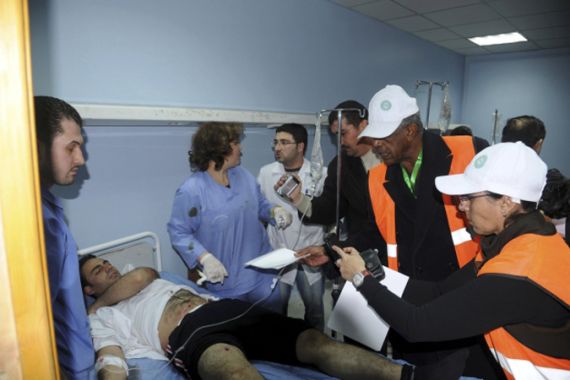Arab League to deploy more Syria monitors
Regional bloc decides to increase the number of observers and give those deployed more resources to monitor violence.

| Al Jazeera has gained exclusive footage of the Free Syrian Army which is fighting the government |
The Arab League has decided to send more observers to Syria, despite criticism over the effectiveness of their mission that is part of a plan to end the violence there.
The decision was taken at an emergency meeting of the league’s foreign ministers in the Egyptian capital Cairo on Sunday to discuss the progress of the mission.
The regional bloc again urged the Syrian government to end its violence against protesters and allow the monitors in the country to work more freely, but stopped short of asking the UN for help.
The arrival of the monitors last month to judge whether the government was honouring a pledge to end the crackdown on the country’s uprisning appears to have done little to the violence, in which the UN says more than 5,000 people have been killed.
After Sunday’s progress meeting in Cairo, the Arab League group on Syria said the government had only partly implemented a promise to stop the crackdown, free those jailed during the crisis and withdraw its troops from cities.
In its closing communique, the league said it would increase the number of monitors from the present 165 and give them more resources, ignoring calls to end what pro-democracy campaigners say is a toothless mission that buys more time for the government to suppress opponents.
Arab League officials said the continuation of the mission, due to make a full report on January 19, depended on the Syrian government’s commitment to ending violence and honouring its promises.
League foreign ministers will discuss the findings on January 19 and 20.
‘Responsibility to act’
“If the … report comes out saying the violence has not stopped, the Arab League will have a responsibility to act on that … We have to be clear and honest with the Syrian people,” Qatari Prime Minister Sheikh Hamad bin Jassim
Al Thani told a news conference after the meeting.
He did not say what the league might do, but President Bashar al-Assad’s failure to abide by the peace plan resulted in Syria’s suspension from the 22-member regional body in November.
The Arab plan also called for Assad’s government to permit peaceful protests, start dialogue with political opponents and allow foreign media to travel freely to the country.
Syria agreed, but the pledge remains unfulfilled.
Qatar, which chairs the group and has been critical of the mission’s performance, had proposed inviting UN technicians and human rights experts to help Arab monitors assess whether Syria was honouring its pledges.
“We have not yet agreed to send individuals,” Sheikh Hamad said. Asked if this could happen in the future, he said: “It depends on how events develop.”
The league’s communique called on the Syrian opposition to present its political vision for the country’s future, and asked the bloc’s secretary general to convene a meeting with them.
In Syria, security forces and pro-Assad armed groups killed seven people on Sunday, in and around the central city of Homs, the Syrian Observatory for Human Rights said.
Another opposition organisation, the Local Co-ordination Committees, put Sunday’s death toll at 14, including 10 in Homs.
The Free Syrian Army, an armed opposition force composed mainly of army deserters, has joined the 10-month revolt, which has turned increasingly violent.
The government says “terrorists” have killed 2,000 members of the security forces during the uprising.